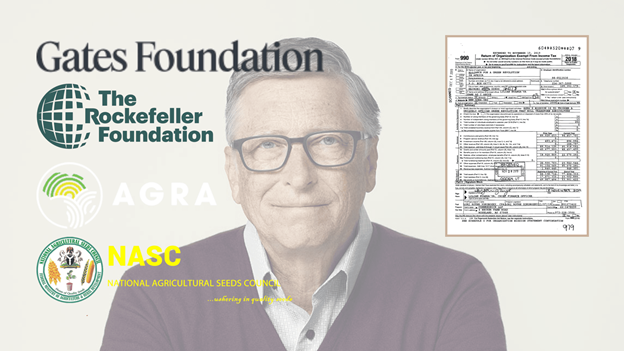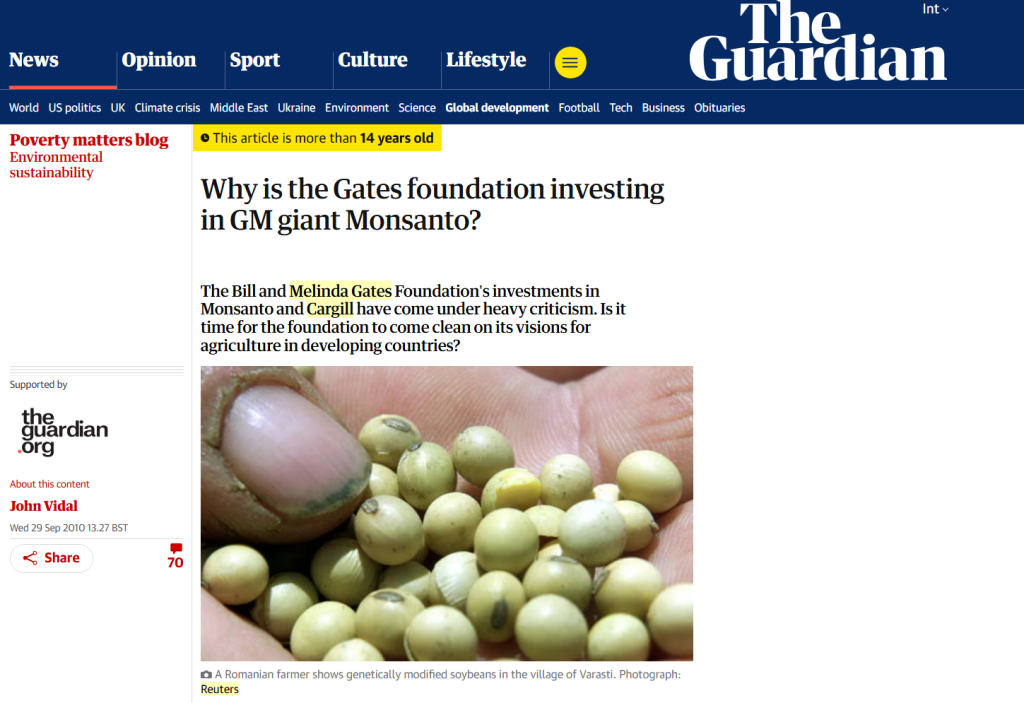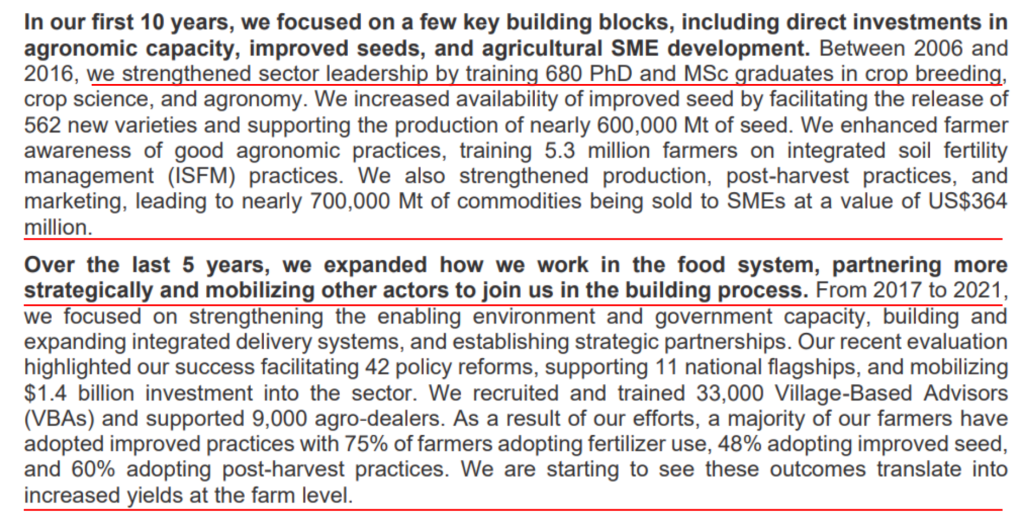
REVEALED: How Gates and Rockefeller-Funded AGRA Undermines Nigeria’s Seed Regulator and Threatens National Sovereignty

A growing body of evidence suggests that Nigeria’s seed regulation system, a critical part of its food sovereignty and agricultural future, is being undermined by the influence of a foreign-backed nonprofit: the Alliance for a Green Revolution in Africa (AGRA).
AGRA, launched in 2006 by the Bill & Melinda Gates Foundation and the Rockefeller Foundation, a foundation whose founding family has ties to the Central Intelligence Agency (CIA), presents itself as a philanthropic initiative aimed at improving food security in Africa. However, AGRA has quietly embedded itself into national agricultural policymaking, steering Nigeria’s seed laws and institutions to favour foreign corporate interests, particularly those tied to genetically modified organisms (GMOs), patented seeds, and agrochemical giants.
AGRA has received over $883 million in funding from the Gates Foundation alone, with additional backing from the UK Foreign, Commonwealth & Development Office (FCDO), USAID, UKAID, and Germany’s Ministry of Economic Cooperation and Development, all channelled through AGRA’s Partnership for Inclusive Agricultural Transformation in Africa (PIATA).

While AGRA claims its mission is to reduce hunger and poverty, a 2022 study found that it failed to meet its stated goals. Instead, the organisation has shifted focus from smallholder support to policy influence, exerting control over seed regulation frameworks across multiple African nations.
In Nigeria, AGRA has partnered with the National Agricultural Seed Council (NASC), the federal agency tasked with overseeing seed quality, local seed enterprise development, and safeguarding seed sovereignty. But rather than supporting the council’s national mandate, AGRA’s involvement has raised alarm bells over conflicts of interest and regulatory capture.
Through this partnership, AGRA has reportedly influenced the development of key agricultural legislation, including the NASC Act (2019) and the Plant Variety Protection Act (2021). Speaking to The Guardian, NASC Acting Director-General Dr Ishiaku Khalid credited AGRA with playing “a role in the food security system in Nigeria by supporting staff training, laboratory upgrades, and equipment supply.”
This kind of foreign-led “support” comes at a high cost:
The removal of independent decision-making in a sector vital to national security.
Promoting Foreign Corporate Interests
Behind AGRA’s donor-driven model lies a deeper agenda: the market expansion of multinational seed and agrochemical corporations such as Monsanto (now Bayer), DuPont, Syngenta, and Pioneer. These companies benefit from increased adoption of lab-engineered seeds, often protected by patents that restrict farmers from saving or reusing them.

AGRA’s operations in Nigeria are a case study in how influence is embedded: through strategic partnerships, staff training, and even shaping legislative text. The introduction of Gates-funded “TELA Maize”, a genetically modified variety promoted in Nigeria, highlights the direct result of these efforts, foreign-controlled seed systems replacing traditional, local alternatives.
According to AGRA’s own “Life of Strategy” report (2017–2021), its strategy includes reforming seed systems across partner countries. In practice, this has meant displacing indigenous farming practices and tightening corporate control over agricultural inputs.

Risk to Food Sovereignty
Nigeria’s partnership with AGRA runs counter to its constitutional responsibility to protect its food systems from foreign interests. By allowing AGRA a role in shaping regulations, approving seed varieties, and training government staff, the NASC may be enabling a donor-driven agenda that prioritises global seed corporations over Nigerian farmers.
AGRA’s Country Director, Dr Kehinde Makinde, recently urged the Nigerian government to “boost its seed policy, seed law, and regulation,” further confirming the organisation’s central role in policy formation. He stressed the need for harmonised documentation, but did not clarify how much of that documentation was influenced or drafted under AGRA’s direction.
This kind of soft power amounts to policy colonisation, where foreign organisations shape the laws of sovereign nations under the banner of development.
As Nigeria faces compounding threats from insecurity and food inflation, the independence of its agricultural institutions has never been more crucial. The NASC’s compliance with AGRA’s agenda has caused growing calls from food sovereignty advocates and civil society for the government to reassess foreign influence in national policymaking, especially in the agricultural sector.
With seed systems at the core of any nation’s food security, the question is not whether Nigeria should partner with global actors, but whether those partnerships respect national sovereignty, empower local farmers, and uphold transparency.
At present, AGRA fails that test.
You can read AGRA’s revised seed sector strategy for investment plan in Nigeria here.
About The Author
Mayowa Durosinmi
author
M. Durosinmi is a West Africa Weekly investigative reporter covering Politics, Human Rights, Health, and Security in West Africa and the Sahel Region
Mayowa Durosinmi
M. Durosinmi is a West Africa Weekly investigative reporter covering Politics, Human Rights, Health, and Security in West Africa and the Sahel Region
Related Articles
AES Condemns Niamey Airport Attack, Warns of Coordinated Destabilisation
The Alliance of Sahel States has strongly condemned the armed attack on...
ByWest Africa WeeklyFebruary 2, 2026Mali Cedes Strategic Land to Guinea to Deepen Trade Cooperation
Mali has approved the transfer of a strategic parcel of land to...
ByWest Africa WeeklyFebruary 2, 2026Senegal to Appeal CAF Sanctions After AFCON Final Controversy
Senegal has announced plans to formally appeal the sanctions imposed by the...
ByWest Africa WeeklyFebruary 2, 2026Burkina Faso Takes Legal Step Toward Nuclear Energy Development
Burkina Faso has voted to join the Vienna Convention on Civil Liability...
ByWest Africa WeeklyFebruary 2, 2026












Leave a comment